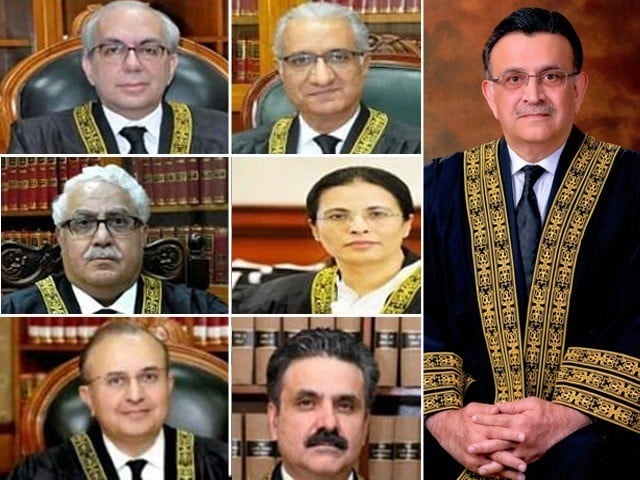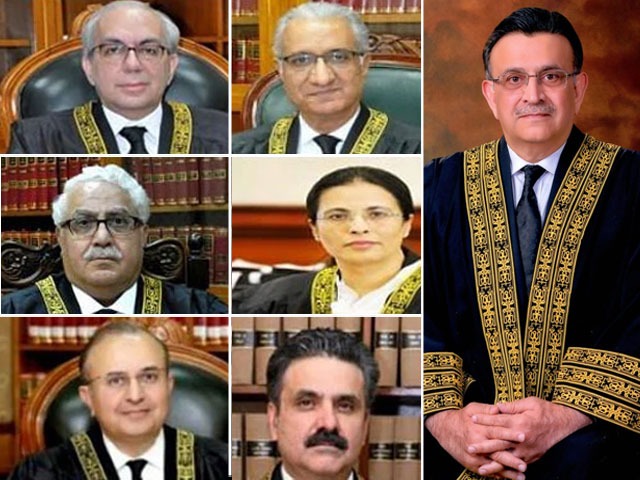
Photo: Express News
Islamabad: A seven-member Larger Bench of the Supreme Court is hearing petitions filed against the trial of civilians in military courts.
The seven-member larger bench headed by Chief Justice of Pakistan Umar Atta Bandial includes Justice Ijaz-ul-Ahsan, Mansoor Ali Shah, Justice Muneeb Akhtar Bench, Justice Yahya Afridi, Justice Mazahir Naqvi and Justice Ayesha Malik.
When the hearing started, civil society lawyer Faisal Siddiqui came to the rostrum and submitted written arguments.
Lawyer Faisal Siddiqui argued that my application is different from the rest of the applications, I will not argue that the trial of a civilian cannot be held in military courts under the Official Secrets Act and also does not say that trial by military courts. It is totally illegal while I will not even say what happened on May 9 or not.
The lawyer of the civil society said that there are examples in the past of the trial of civilians, proceedings cannot be conducted in military courts under military regulations, so I did not challenge it and I did not challenge the acquittal of any accused. Certain persons were selected in the process of handing over.
He argued that the Army Act is being used maliciously, went to the court and was asked to hand over 15 people, those who will be tried in the anti-terrorism court will have the right to appeal, but those who The trial will be in military courts, they have no right of appeal.
Liaquat Hussain, Saeed Zaman and District Bar Association cases were cited by Faisal Siddiqui.
Justice Ayesha Malik remarked that there are specific circumstances in which a trial can be held in military courts. Faisal Siddiqui said that court decisions say that there should be a clear distinction and we do not say that people should not have a strict trial, where can there be a stricter trial than the anti-terrorism court.
Justice Mansoor Ali Shah remarked that due to national security, it was said that this trial was held in military courts, if it goes to the limits of state security, then the trial is mentioned to be held in military courts. Justice Mazahar Akbar Naqori inquired when the Official Secrets Act was included.
Faisal Siddiqui said that the 21st Amendment case was referred by Justice Yahya Afridi, the decisions of the military courts formed as a result of the 21st Amendment were challenged in the Supreme Court.
Justice Ayesha Malik inquired that civilians can be tried in military courts under what circumstances? Faisal Siddiqui said that in the 21st Amendment case, the court had said that the trial must be related to the Army Act.
Justice Yahya Afridi remarked that you do not understand that the Attorney General should be asked first how the cases were made, on which the Chief Justice remarked that you should continue with the arguments and will hear the Attorney General after the lawyers, maybe the Attorney General asked tomorrow. Give a statement today on the details.
Faisal Siddiqui said that when the court asked that these petitions should not have gone to the High Court first, it is a matter of more than one province, one High Court cannot have jurisdiction, these petitions can be heard only in the Supreme Court.
Justice Ayesha Malik remarked whether your arguments are complete to the extent that the petitions are admissible. Faisal Siddiqui said that the arguments are complete till the petitions are admissible, now let’s move on. Justice Ayesha Malik remarked that the nature of charges against those who were handed over to military courts may be different, you are only saying on assumptions that there is no evidence against these people.
Justice Yahya Afridi remarked that you are going to a general discussion, it is not even known under which clause these people were sent to military courts. Lawyer Faisal Siddiqui said that if there is evidence against him, then I will show how he cannot be sent to military courts.
The Chief Justice remarked to limit his arguments to the relevant points, today is reserved for the petitioners to give their arguments till three o’clock.
Justice Mansoor Ali Shah remarked that the law does not say that the official secret act will apply only if there is an employee working within the military, the act is also applicable to the crime of being within the military limits, you tell the military. How to impeach someone in the courts, the Official Secrets Act also applies to restricted areas, buildings and some civil buildings.
Justice Mazahir Naqvi remarked that you have not yet made the basic point, when were the provisions of the Official Secrets Act added to the FIRs, Justice Mazahir Naqvi.
If the FIR does not include the provisions of the Official Secrets Act, can the commanding officer seek extradition of the accused? Justice Mazahar Naqvi
(function(d, s, id){
var js, fjs = d.getElementsByTagName(s)[0];
if (d.getElementById(id)) {return;}
js = d.createElement(s); js.id = id;
js.src = “//connect.facebook.net/en_US/sdk.js#xfbml=1&version=v2.3&appId=770767426360150”;
fjs.parentNode.insertBefore(js, fjs);
}(document, ‘script’, ‘facebook-jssdk’));
(function(d, s, id) {
var js, fjs = d.getElementsByTagName(s)[0];
if (d.getElementById(id)) return;
js = d.createElement(s); js.id = id;
js.src = “//connect.facebook.net/en_GB/sdk.js#xfbml=1&version=v2.7”;
fjs.parentNode.insertBefore(js, fjs);
}(document, ‘script’, ‘facebook-jssdk’));



